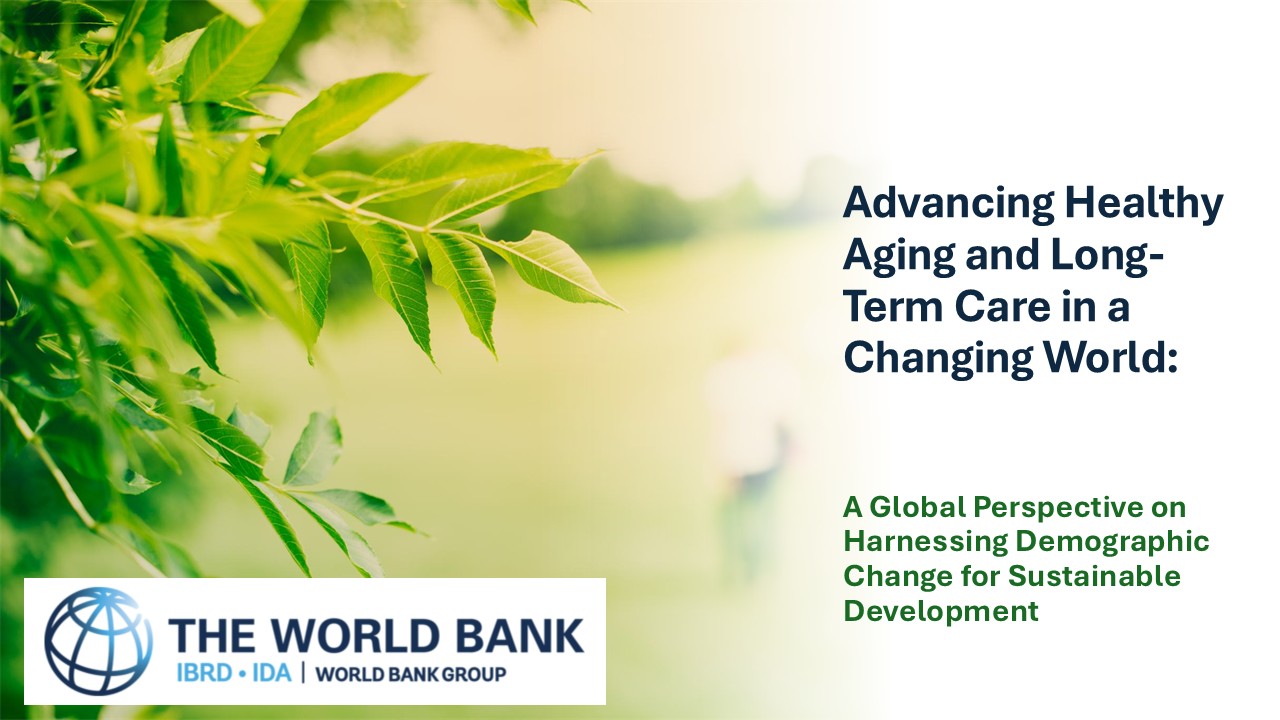Side Meetings
SMB215
Advancing Healthy Aging and Long-Term Care in a Changing World: Global Perspectives on Harnessing Demographic Change for Sustainable Development
26
Jan
- World Bank

Aging is one of humanity’s greatest development stories. As populations worldwide enjoy unprecedented longevity and enter an era where adults in their fifties and sixties remain healthy and productive, societies are experiencing a profound demographic shift. This rapid aging, particularly in developing countries, challenges traditional health systems, social structures, and labor markets to adapt more swiftly than in the past. The need for strategic, proactive planning is urgent, as countries face compressed timelines for demographic transitions that once spanned generations. While these changes may strain resources and infrastructure, they also present significant opportunities—if harnessed well, the experience and vitality of older adults can become powerful engines for social and economic development.
To meet these challenges, health and social care systems must be reimagined with a clear focus on healthy aging, prioritizing the maintenance of functional ability and the delay of morbidity throughout the life course. Integrated, person-centered long-term care models are essential to support older adults, especially as care dependency arises. Global collaboration, knowledge sharing, and policy innovation highlighted by country experiences across geographies such as EAP (e.g., Thailand, Japan, China, Korea), ECA (e.g., Türkiye, Poland), LAC (e.g., Brazil, Colombia, Costa Rica, Uruguay), MENA (e.g., Saudi Arabia, Morocco), SAR (e.g., India, Nepal, Bhutan, Sri Lanka) are critical for developing sustainable approaches to healthy aging. By shifting the conversation and investing in systems that empower older adults to age with dignity in their communities, societies can turn the realities of aging into a foundation for progress and resilience.
The workshop will be split into two interrelated sessions. 1) The morning session will set the context and present the global imperative for healthy aging and aging economies, and discuss country experiences with developing national aging strategies and policies 2) The afternoon session will delve into targeted discussions around country innovations, progress, and challenges across four core Long Term Care (LTC) topics: Integrated Service Delivery, for LTC, Digital Innovation for LTC, Care workforce, and LTC Financing. The workshop will be highly participatory, and draw on the global experience and oportunities with strengthening LTC systems.
- Share concrete evidence, operational strategies, and country experiences on healthy aging as a life-course agenda, with a focus on prevention, strengthening primary health care (PHC), and implementing multisectoral policies
- Delve into country experiences with strengthening Long Term Care Systems, in partiuclar 1) Integrated Service Delivery Systems to reduce fragmenation between health and social sectors 2) Digital innovation and technology for LTC 3) Care Workforce for LTC, and 4) Financing systems for LTC
- Facilitate peer learning and cross-regional dialogue on policy reforms, measurement, and implementation challenges, while introducing World Bank tools, frameworks, and resources available to support countries in planning and executing healthy aging and long-term care reforms.

